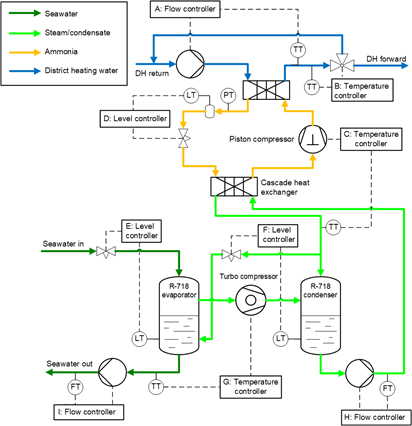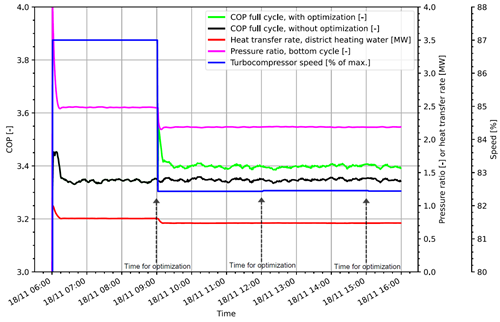
Development of optimization framework for Digital Twins
Presentation of a dynamic model for optimizing operation and increasing reliability of a large-scale heat pump for district heating operating with seawater and ammonia at ECOS 2022.
The project Digital Twins for Large-Scale Heat Pumps and Refrigeration Systems has contributed to this year's ECOS conference. The project was represented with a study made by Jonas Lundsted Poulsen, Danish Technological Institute, about the development of a optimization framework for Digital Twins based on a model-based analysis of the heat pump cascade system operated by Kredsløb in Aarhus, Denmark.

Layout of the cascade heat pump system.

Top cycle: HeatPac 108S-V. Bottom cycle: Steam compression with axial multi-stage compressor.
Digital twin-based solutions have proven to be a promising approach when it comes to being able to ensure optimal operation of heat pumps and increasing their reliability. The study presented a developed dynamic model made in Dymola, which is used as the basis for a digital twin of the cascade heat pump system. The simulation model predicted a COP of 3.35 in a part load case for the heat pump.
Furthermore, the study presented suitable modelling approaches and parametrization considering the trade-off between modelling detail and accuracy. The dynamic model was used in a novel optimization framework where the aim was to perform continuous set-point optimization of the steam compressor for maximizing the COP in the large-scale heat pump.
The presented framework was found to be a promising approach for further developing digital twin-based services and for using it as a basis for optimizing the operation of large-scale heat pump systems. This was exemplified with a suggested set-point optimization for the compressor speed in the bottom steam cycle, which yielded an increase of 1.5 % for the COP compared to a representative operating point for the system without using the developed optimization framework. An example of this is shown in the following figure where the speed of the turbo compressor is changed every third hour in order to maximize the COP.

Example of continuous set-point optimization of the COP every third hour.
The ECOS conference 2022 is part of a series of international conferences which focus on modern aspects of thermal sciences with particular emphasis on thermodynamics and its applications in energy. Read more about ECOS 2022.